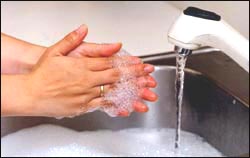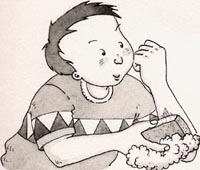Emergency treatment for spilling of chemical product, toxic product or drug on the skin
화학물질이나 독성물질, 약물 등으로 생긴 피부 중독의 치료
Overview of addiction treatment when chemicals, toxic substances, drugs, etc. are on the skin.
Strong acid, Strong alkali, raticide, hydrocarbon, pesticide, chemical substance, Or drugs, etc.
Accidental contact with the skin can result in systemic poisoning, skin chemical burns, or dermatitis (see Preventing Chemical Poisoning).
Emergency treatment of poisoning that may occur due to chemicals, toxic substances, drugs, etc. on the skin

▴ Photo 1-37.
If hazardous substances such as poisons, chemicals, or drugs get on the skin or get into the eyes, rinse thoroughly with running tap water or water in a clean container for 5-15 minutes. In some cases, take a shower to wash. Copyright ⓒ 2011 John Sangwon Lee, MD., FAAP
Emergency treatment methods may differ depending on the type of chemicals on the skin.
If hazardous substances such as chemicals get on your skin, wash them thoroughly with running tap water for at least 5-15 minutes.
Otherwise, pour the clean water in the container with your palm or cup and wash it several times.
You can take off your clothes and soak your face in a shower for 5-15 minutes if you get a lot of harmful chemicals on the skin of your face.
The most important treatment here is time. In other words, it must be treated immediately.
Metal elements such as Lithium, Sodium, Magnesium, Potassium, etc., may ignite when they come into contact with water, so do not rinse with water when such chemical substances get on your skin.
If hydrofluoric acid gets on your skin, it hurts and damages the skin so much, so wash it with cold water and wipe it with alkaline soap.
And it is treated with an injection of 10% calcium gluconate (calcium gluconate). When chemicals get on your clothes, it’s likely that they are also on your skin, so take off your clothes quickly and carefully so that the chemicals do not get on your skin anymore.
Take off clothes that have been exposed to poisons or chemicals, or wash them appropriately.
At the same time, if possible, call a poison poisoning prevention emergency treatment center, hospital emergency room, or a regular pediatrics department and follow their instructions to provide on-site emergency treatment. Emergency treatment is provided according to containers or boxes containing chemical substances and instructions, etc. until medical paramedics arrive at the site and transfer the child to the hospital emergency room with them. For reference, sometimes more sufficient and adequate information is not available from the first aid instructions written on the chemical container.

▴ Figure 1-9. If toxic substances such as chemicals or drugs get on the skin in an accident, Immediately remove the clothes you are wearing and wash the contaminated skin thoroughly with tap water or clean water in a container. Wash with running tap water or shower depending on the type of chemical, the degree of smearing, and the part of the body. Sometimes it is washed with water in a container. And treat according to your doctor’s instructions. Copyright ⓒ 2011 John Sangwon Lee, MD., FAAP
When alkaline chemicals such as NaOH/Sodium hydroxide or KOH/Potassium hydroxide or acidic chemicals such as inorganic acids get on your skin or hair, use tap water, shower water, or clean water placed in a container immediately. -Wash thoroughly for 15 minutes.
Sometimes, to save more time, shower while wearing clothes and wash your hair with shampoo. At this time, be careful not to let chemicals on your head get into your eyes, mouth, or nostrils.
Even if there seems to be no abnormality at first glance when a chemical substance gets on your skin, call the poison poisoning emergency treatment center, regular pediatrics department, or hospital emergency room and follow their instructions.
How good would it be if all general hospital emergency departments were established by national law to promptly respond to emergency telephones counseling treatment, such as emergency treatment drugs or chemical poisoning emergency treatment?
When chemicals, etc., are on the skin of infants and toddlers, it is assumed that they have drunk the chemicals, and emergency treatment is appropriate. Observe for signs of symptoms that may occur when you drink chemicals, and if signs of poisoning such as chemicals appear, take emergency treatment according to the symptoms.
It is not recommended to use a thin scrubbing method to wash away chemicals from the skin.
The most important thing is to keep chemical substances or drugs in a safe place out of reach of children and adolescents, especially infants, to prevent accidents of poisons caused by chemical substances from happening again. [Parents should also be anti-doctors-Child and Family Nursing Encyclopedia]-See Volume 2, Prevention of Child and Adolescent Disease, Safety Accidents.
Copyright drleepediatrics.com 2/16/2026